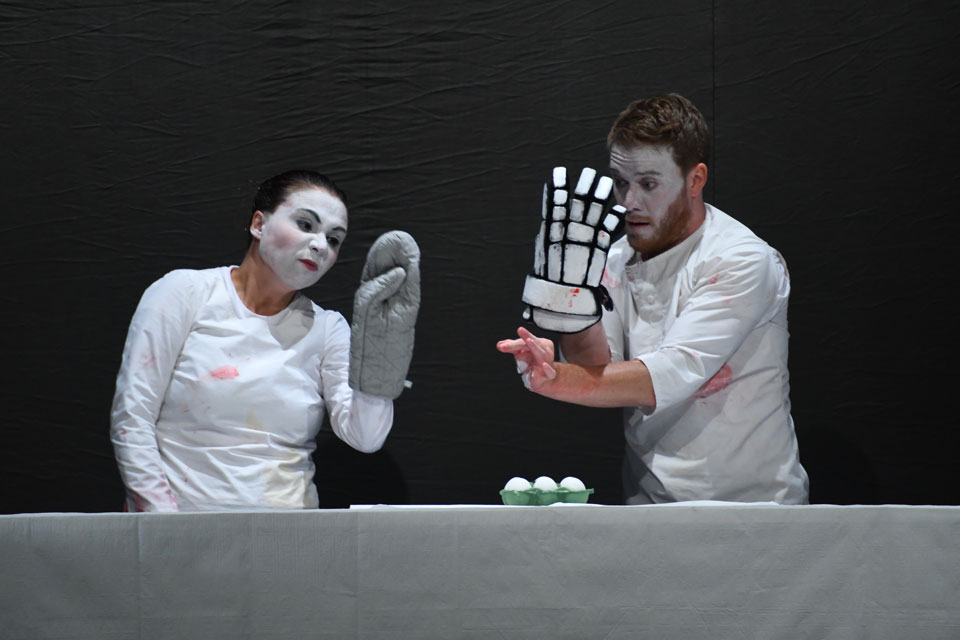Among the diverse formats presented at the 4th Novi Sad Theatre Festival — from puppet shows to live-action plays, from performances for toddlers to those targeting young adult audiences — the festival concluded with the wordless performance Macbeth Muet by La Fille Du Laitier Theatre from Montreal, Canada. The production was honored with three festival awards: the Grand Prix for Best Overall Production, Best Direction, and Outstanding Acting Performance.
Macbeth Muet remains true to Shakespeare’s famed tragedy — with the striking difference that not a single word is spoken. The creators, Marie-Hélène Bélanger Dumas and Jon Lachlan Stewart, who also perform alongside Jérémy Francoeur, condense the story of Macbeth into a fast-paced 60-minute piece. While largely following the sequence of Shakespeare’s original, the narrative is conveyed through movement and creative use of props, some of which double as puppets. The result is a brisk, rhythmically sharp performance in which key scenes are reduced to a few essential gestures that efficiently carry the plot forward.
The two performers primarily take on the roles of Macbeth and Lady Macbeth, while supporting characters are portrayed through animated objects using puppetry techniques — though they occasionally embody secondary characters themselves. Battle scenes are rendered through choreographed duels and the spilling of red paint from small cups, while Macbeth’s spirals into guilt and paranoia are brought to life through Jérémy Francoeur’s intense, spasmodic movements. The couple’s initial encounter is presented in a stylized, absurdly comic prologue — a caricature of sex, followed by the smashing of eggs, symbolizing their infertility. Throughout the performance, the actors wear white shirts that gradually become stained with egg, paint, and grime — a visible metaphor for their characters' moral decay.
In its aesthetic and referential approach to culture, Macbeth Muet can be described as thoroughly postmodern. Drawing on classical literature and theatre, the show presumes at least a basic familiarity with Shakespeare’s Macbeth to fully grasp the storyline. It also takes cues from silent film — not just through mime and theatrical movement, but with paper title cards that simulate intertitles, providing both context and guidance (e.g., Prologue). Music plays a crucial role — not merely as background, but as an active narrative force. Jon Lachlan Stewart’s soundtrack, a collage of excerpts spanning classical, pop, and hip-hop, reinforces the show’s postmodern nature. One particularly telling moment is Lady Macbeth’s descent into madness, accompanied by Simon & Garfunkel’s The Sound of Silence (“Hello darkness, my old friend”), highlighting the production’s self-awareness and dark humor. Similarly, irreverent captions like “Macbeth just got fate-f*cked” add to the show’s ironic tone.
Yet, as with many postmodern works, Macbeth Muet’s heavy reliance on irony and cultural references risks becoming self-serving. The performance often indulges in pastiche without fully articulating its purpose, and it notably avoids deeper interpretation of the tragedy’s psychological and moral themes. With a lesser piece, such an approach might warrant a harsher critique. But here, the production’s playful inventiveness and near-flawless pacing make it hard to begrudge. Macbeth Muet succeeds in being clever, energetic, and unapologetically bold — and that, in the end, is its greatest strength.
Borisav Matić




